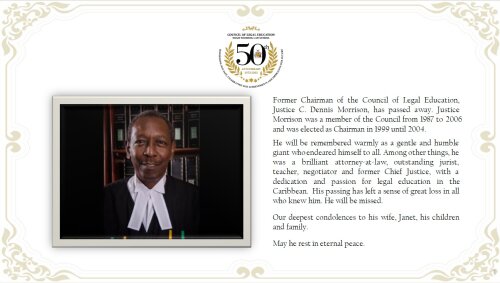Best Property Insurance Lawyers in Trinidad and Tobago
Share your needs with us, get contacted by law firms.
Free. Takes 2 min.
Or refine your search by selecting a city:
List of the best lawyers in Trinidad and Tobago
About Property Insurance Law in Trinidad and Tobago
Property Insurance Law in Trinidad and Tobago is designed to protect property owners from financial losses related to damage or destruction of their properties due to unforeseen events like natural disasters, fires, theft, and vandalism. The legal framework ensures that both insurers and policyholders adhere to their contractual obligations. In this region, regulations and guidelines oversee insurance companies to ensure fair practices and stable operations, thereby maintaining trust and reliability in the market.
Why You May Need a Lawyer
Legal assistance may become essential in several scenarios involving property insurance. Firstly, interpreting the complex terms and conditions of an insurance policy by oneself can be challenging. There could also be disputes regarding claim settlements, where an insurer might deny or undervalue a claim, necessitating professional negotiation and litigation. Legal advice can also be critical in understanding policy rights and obligations, ensuring compliance with local laws, and addressing any incidences of insurer misconduct. In instances of significant loss, having a lawyer can ensure all legal avenues are leveraged to receive just compensation.
Local Laws Overview
The Insurance Act in Trinidad and Tobago forms the backbone of the regulatory framework governing property insurance. The Act outlines licensing requirements for insurers, mandates adequate capital reserves, and details consumer protection standards. Additionally, the Financial Ombudsman provides mechanisms for dispute resolution. The Insurance (Amendment) Act and attendant regulations further enhance transparency, accountability, and flexibility in the market. It is important to understand that the principle of 'utmost good faith' is pivotal in insurance law here, obligating parties to act honestly and not mislead or withhold crucial information.
Frequently Asked Questions
What does property insurance typically cover in Trinidad and Tobago?
Property insurance generally covers damages caused by natural disasters, fires, theft, and vandalism. However, the extent of coverage may vary based on the specific policy. It's essential to review the policy details and exclusions.
How can I file a claim if my property is damaged?
To file a claim, contact your insurer as soon as possible, providing details of the incident and any supporting documentation or evidence. An adjuster might be sent to assess the damage before processing your claim.
What should I do if my insurance claim is denied?
If your claim is denied, review the denial letter closely, and gather any additional evidence to support your claim. Consider contacting a property insurance lawyer for assistance in appealing the decision.
What is the role of the Financial Ombudsman in property insurance disputes?
The Financial Ombudsman offers a free, fair, and independent service to settle disputes between consumers and financial institutions, including insurance companies, without the need for litigation.
Are there mandatory property insurance requirements in Trinidad and Tobago?
While property insurance is not legally required for private property, financial institutions typically require it when a property is financed via a mortgage to protect the investment.
How can I choose the right property insurance policy?
Consider the coverage limits, exclusions, deductibles, and premium costs. Comparing various insurance providers and consulting with an insurance broker can also be beneficial.
Can insurers in Trinidad and Tobago modify my premium after the policy is issued?
Insurers can adjust premiums based on numerous factors, such as claims history and changes in risk exposure, but they must adhere to specified notice periods and legal guidelines.
What rights do I have as a policyholder?
As a policyholder, you are entitled to receive a detailed policy document, fair treatment by the insurer, timely feedback on claims, and access to an independent resolution mechanism if disputes arise.
What are some common exclusions in property insurance policies?
Typical exclusions may include wear and tear, damages from war or nuclear hazards, intentional acts, and damages due to maintenance negligence. It's crucial to read the policy terms thoroughly.
How can I cancel my property insurance policy?
To cancel your policy, provide written notice to your insurer. The cancellation terms, including any penalties or refunds, will depend on your policy agreement.
Additional Resources
If you need further assistance with property insurance, consider reaching out to the following resources: the Office of the Supervisor of Insurance, the Association of Trinidad and Tobago Insurance Companies (ATTIC), and local consumer protection agencies. These organizations can provide advice and support, and help you understand your rights and obligations under the law.
Next Steps
If you find yourself in need of legal assistance in property insurance, it is advisable to start by collecting all relevant documentation, such as your insurance policy, correspondence with your insurer, and any evidence regarding your claim. Next, consult with a qualified property insurance lawyer who can evaluate your situation, advise on the best course of action, and represent your interests. Consider engaging with local legal directories or seeking recommendations from professional bodies to find an experienced attorney. Do not delay in seeking legal counsel, particularly if there are strict deadlines for filing claims or appeals.
Lawzana helps you find the best lawyers and law firms in Trinidad and Tobago through a curated and pre-screened list of qualified legal professionals. Our platform offers rankings and detailed profiles of attorneys and law firms, allowing you to compare based on practice areas, including Property Insurance, experience, and client feedback.
Each profile includes a description of the firm's areas of practice, client reviews, team members and partners, year of establishment, spoken languages, office locations, contact information, social media presence, and any published articles or resources. Most firms on our platform speak English and are experienced in both local and international legal matters.
Get a quote from top-rated law firms in Trinidad and Tobago — quickly, securely, and without unnecessary hassle.
Disclaimer:
The information provided on this page is for general informational purposes only and does not constitute legal advice. While we strive to ensure the accuracy and relevance of the content, legal information may change over time, and interpretations of the law can vary. You should always consult with a qualified legal professional for advice specific to your situation.
We disclaim all liability for actions taken or not taken based on the content of this page. If you believe any information is incorrect or outdated, please contact us, and we will review and update it where appropriate.
Browse property insurance law firms by city in Trinidad and Tobago
Refine your search by selecting a city.










